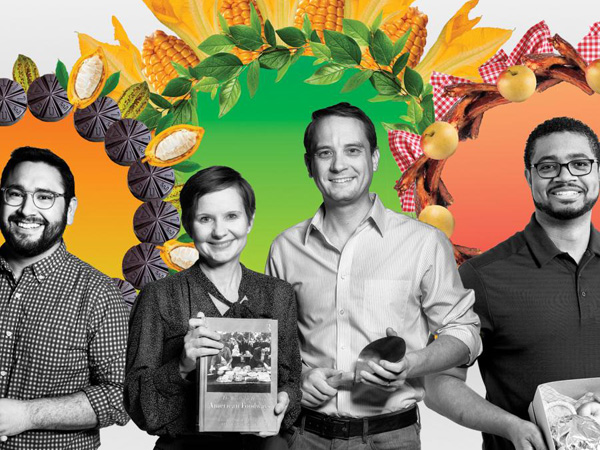|
|
|
|
|
|
 |
|
Feeding the Mind
Across disciplines, UNT is exploring the relationship between food and human experience, tackling topics ranging from race relations to global shortages to economic impacts. The Department of History has taken a leading role in expanding the university's food-based curriculum. In addition to rolling out a Body, Place and Identity concentration in 2018 for doctoral students, last year it launched an interdisciplinary food studies certificate for undergraduates. The department also began offering a $5,000 graduate-level food history fellowship funded by the Julia Child Foundation for Gastronomy and the Culinary Arts. And while researchers in UNT's BioDiscovery Institute are using plant science to lead to future breakthroughs in more sustainable crops such as wheat, corn and coffee to meet the market needs, the College of Merchandising, Hospitality and Tourism has paired up with Dining Services to work with the Menus of Change University Research Collaboration, a nationwide organization that promotes sustainability and social responsibility in the food service industries.
|
|
|
|
|
|
|
|
 Providing COVID-19 health information to minority language groups Providing COVID-19 health information to minority language groups
Researchers at UNT and Indiana University are partnering to communicate effectively about COVID-19 to one of the largest refugee groups in the U.S. — refugees of Myanmar, who are members of the Chin language community. A new study led by Shobhana Chelliah, Distinguished Research Professor of linguistics at UNT, and Kelly Harper Berkson, assistant professor of linguistics at IU, together with Sara Champlin, assistant professor of advertising at UNT, seeks to find ways to make the information more accessible and culturally relevant for these specific audiences in order to ensure that they are getting the health information they need to stay safe.
|
|
|
|
|
|
| Making nuclear waste contamination safer in the future |
Jincheng Du, an internationally recognized researcher on nuclear waste disposal by vitrification, found that the current models of storage site longevity need improvement. Systems expected to last for hundreds of thousands of years could fail sooner, leading to potential radioactive contamination affecting plants, animals and humans, due to interaction effect of different types of materials on corrosion. Du recently explored new glass composition used to contain nuclear waste, and in the last year, he has been recognized by the U.S. Department of State with a Fulbright U.S. Scholar Award, the International Commission on Glass's W.E.S. Turner Award and Corning's 2019 Gordon S. Fulcher Distinguished Scholar Award.
|
|
|
|
|
|
|
| Creating fresher air for astronauts |
|
Alyssa Sarvadi, a recent graduate of the College of Engineering, and mentor, Huseyin Bostanci, associate professor of engineering technology, believe they have found a better way to clean the air aboard spaceships. NASA agrees, backing it up with up to $80,000 a year for two years that will allow Sarvadi to continue researching mechanical and energy engineering at UNT as a graduate student and work at NASA during the next two summers. Sarvadi also was part of a team led by Bostanci that competed in NASA's XHab Challenge, the first of two NASA challenges Bostanci has received funding for. The second challenge is to lead a team in the Moon to Mars eXploration Systems and Habitation Academic Challenge.
|
|
|
|
|
|
|
| Sensing cancer in real time |
|
Doctors could soon have a new way to determine if a cell is cancerous in real time by measuring its thermal properties, thanks to Tae-Youl Choi, a mechanical energy and engineering professor in UNT's College of Engineering. Choi has developed a sensor technology that will allow for quicker and more reliable diagnosis of cancerous or precancerous cells. Doctors also should be able to determine the boundary between cancerous and healthy tissue during surgery rather than having to remove tissue from around a tumor for testing in a lab.
|
|
|
|
|
|
|
| Researching pollinators |
|
The College of Science's newest ecology faculty member is serious about pollinators. Elinor Lichtenberg's research aims to help humans understand how to conserve species thttps://news.unt.edu/news-releases/unt-named-bee-campus-fifth-straight-year-its-efforts-foster-pollinator-habitat-andhat help ecosystems thrive. "My research expertise and a personal interest in pollinators and plant-insect interactions is an exciting fit with UNT's Bee Campus and Denton's Bee City statuses," Lichtenberg says. "I also look forward to utilizing UNT's Pollinative Prairie and the Lewisville Lake Environmental Learning Area in my teaching and research."
|
|
|
|
|
|
|
| Presenting student research virtually |
|
When COVID-19 forced cancelation of the UNT Global Digital Retailing Center's annual Consumer Experience Symposium, the second annual Student Research Symposium, part of the event showcasing student research, continued on — transitioning to an online format. Student presentations ranged from "Visitors' Attitudes and Perceptions of Zoos" to "Effects of Consumer Trust for Online vs. In-Store Grocery Shopping." Cindy Carillo, a recent hospitality management graduate, received the Best Research Award for "Anxiety in the Workplace: A Study of Different Anxiety Relief Methods for Hotel Employees." Learn more about the innovative student presentations and research awardees.
|
|
|
|
|
|